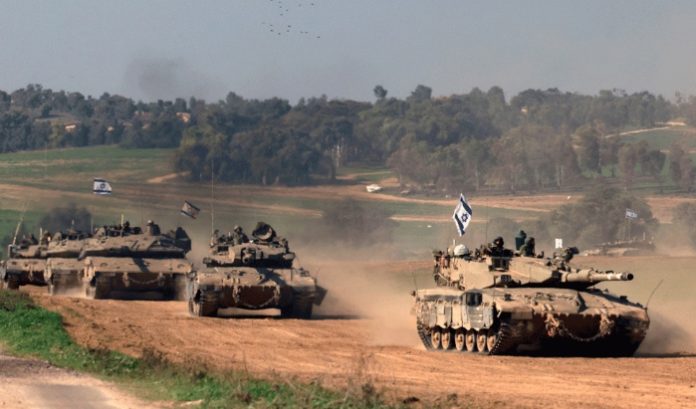Israeli troops pounded Gaza City early Monday morning, sending columns of tanks into the city centre from multiple directions in what residents said was one of the heaviest attacks since the start of the war between Israel and Hamas.
The heaviest Israeli attack since the start of the war
Gaza’s Civil Emergency Services said they believed dozens of people had died in eastern Gaza, but ambulance crews were unable to reach them because of ongoing offensives in Tel Al-Hawa, Sabra, Daraj, Rimal and Tuffah suburbs.
The Israeli military said in a statement that it was carrying out an operation against militant infrastructure in the Gaza Strip and incapacitated more than 30 militants who posed a threat to Israeli troops.
Several officials in the Middle East and the US believe the level of destruction in the Gaza Strip caused by the nine-month Israeli offensive has probably helped Hamas soften its demands for a ceasefire agreement.
Hamas softens ceasefire demands
Over the weekend, Hamas appeared to drop its longstanding demand that Israel promise to end the war as part of any ceasefire agreement. This unexpected change has raised new hopes for progress in internationally mediated talks.
Israeli Prime Minister Benjamin Netanyahu boasted on Sunday that military pressure – including Israel’s two-month-old offensive on the southern Gaza town of Rafah – “is what forced Hamas to start negotiations.”
But the latest internal messages, which have come to the attention of The Associated Press, signed by several senior Hamas officials in Gaza call on the exiled group’s political leadership to accept a cease-fire proposal put forward by US President Joe Biden.
The messages, described by a Middle East official familiar with the talks, refer to the heavy losses Hamas has suffered on the battlefield and the harsh conditions in the war-ravaged territory. The official spoke on condition of anonymity so as not to reveal the contents of internal Hamas communications.
It is not known whether this internal pressure has become a factor in Hamas’s flexibility. But the reports point to divisions within the group and the willingness of top militants to strike a deal quickly, even if Hamas’ top official in Gaza, Yahya Sinwar, may not be in a hurry. Sinwar has been a fugitive since the war began last October and is believed to be trapped in a tunnel deep underground. US officials declined to comment on the reports.
Gaps in ceasefire discussions still remain
Egypt and Qatar have been working with the USto try to broker a ceasefire and end the devastating nine-month war. After months of hiatus, talks resumed last week and are expected to continue in the coming days.
A deal is still not guaranteed. Netanyahu’s office said over the weekend that “gaps still remain.” US officials said they were cautiously optimistic about the prospects for a ceasefire based on recent developments, but emphasised that numerous attempts had looked promising but failed.
Still, the sides appear to be closer to an agreement than they have been in months.
Israel launched the war in Gaza after an October Hamas attack in which militants stormed southern Israel, killed about 1,200 people – mostly civilians – and kidnapped about 250. Israel says Hamas is still holding about 120 hostages – about a third of whom are presumed dead.
Since then, the Israeli air and ground offensive in Gaza has killed more than 38,000 people, according to the territory’s Health Ministry, which does not distinguish between combatants and civilians. The offensive has caused widespread destruction and a humanitarian crisis that has left hundreds of thousands of people on the brink of starvation, according to international officials.
The Gaza war has sparked an international legal probe into Israel’s actions, including a case in the UN’s highest court accusing South Africa of genocide and a request for arrest warrants for Netanyahu by the International Criminal Court prosecutor, who has also sought arrest warrants for Hamas leaders.
Children continue to die of starvation
Meanwhile, a six-year-old child died of starvation, dehydration and lack of medicine at the Al-Aqsa Martyrs Hospital in central Gaza on Monday.
The child’s death brings the total number of Palestinians who have died of malnutrition since Israel’s war on Gaza to 41, according to the Gaza Health Ministry.
UNRWA said in June that more than 50,000 children in the Gaza Strip need immediate medical attention due to severe malnutrition. A source at Nasser Hospital in Khan Younis said that children in the neonatal unit could die due to the stoppage of electricity generators caused by the fuel crisis.
UNICEF warned that 3,000 children in the Gaza Strip are on the verge of death due to malnutrition caused by Israeli restrictions on food imports into northern Gaza.
